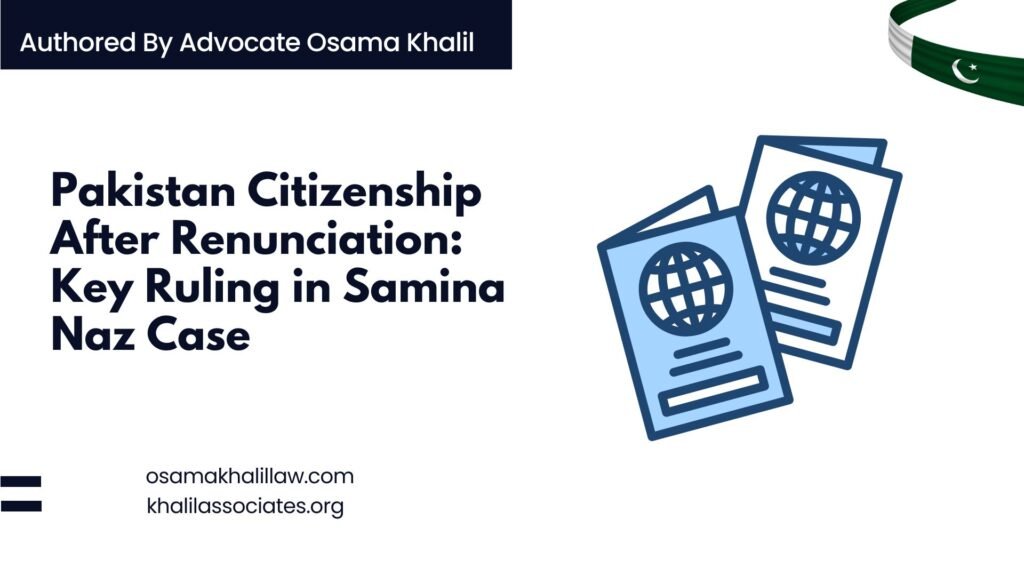
The Islamabad High Court delivered a significant judgement on March 31, 2021, concerning a woman’s attempt to regain her Pakistani citizenship after she had given it up. This case, known as Mst. Samina Naz vs. Pakistan, clarifies the complex laws around dual nationality and the specific conditions for returning citizens. For anyone navigating citizenship issues, this ruling provides crucial guidance.
Who Was Involved in the Citizenship Case?
The case involved a woman named Mst. Samina Naz as the main petitioner. Originally from Mianwali, Pakistan, she married an Indian national in 1995. Later, she formally renounced her Pakistani citizenship in 2004 and subsequently obtained Indian citizenship. She had three children with her Indian husband. The respondents in the case were the Government of Pakistan, specifically the Ministry of Interior and the Immigration and Passports department.
What Was the Core Problem and Legal Petition?
Samina Naz and her children returned to Pakistan in late 2018 and began living there. Her eldest son passed a university entrance exam for the University of Health Sciences (UHS) in Lahore. However, the university classified him as a “foreign student,” which meant his tuition fees would be substantially higher than those for a Pakistani student. To resolve this, the family filed a petition in court. They asked the court to order the government to grant them Pakistani citizenship and to declare that the university should not treat her sons as foreign students.
The Special Protection for Pakistani Women Married to Foreigners
The lawyers for Samina Naz argued a critical point of law. They correctly stated that Pakistani law has a special provision for its female citizens. The law clearly says that if a Pakistani woman marries a foreigner, she does not automatically lose her Pakistani citizenship. This law exists specifically to protect women from statelessness and to safeguard their rights, even if they acquire another nationality through marriage. Therefore, her marriage to an Indian citizen alone should not have cost her, her Pakistani status.
Why Did the Court Reject the Argument?
The court acknowledged this legal protection for women. However, the situation for Samina Naz was different. The crucial fact was that she did not just acquire Indian citizenship; she actively took the step to formally renounce her Pakistani citizenship in 2004. By completing this official renunciation process, she voluntarily terminated her legal status as a Pakistani citizen. Consequently, the special protection for married women no longer applied to her case because she had willingly surrendered her rights.
The Central Issue of Dual Nationality and Surrender of Documents
The government officials stated that they would consider her application to regain citizenship only if she first surrendered all documents proving her Indian nationality. This list included her Indian passport, her Indian citizenship certificate, her Indian ID card, and, most importantly, the certificate proving she had renounced Pakistan. The court found this condition perfectly reasonable. The judges emphasized that the core principle of Pakistani citizenship law is to prevent dual citizenship unless a specific treaty exists, which is not the case with India. Allowing her to regain Pakistani citizenship while still holding Indian documents would effectively grant her multiple nationalities, which the law expressly forbids for someone in her situation.
The Status of the Children and Citizenship by Descent
The court also examined the citizenship status of each of her three children separately. Pakistani law grants citizenship by descent if at least one parent is Pakistani at the time of the child’s birth. The two older sons were born before Samina Naz renounced her Pakistani citizenship. Therefore, they were originally Pakistani citizens by descent but lost that status when their mother renounced hers. Their path to resuming citizenship involves making a formal declaration within one year of turning 21. The youngest daughter was born after the renunciation, when her mother was solely an Indian citizen. Thus, the daughter was always an Indian citizen and has no claim to Pakistani citizenship by descent.
The Commonwealth Citizen Route and Why It Failed
The family also tried to apply for citizenship under a rule for “Commonwealth citizens.” Both India and Pakistan are part of the Commonwealth. The court noted that while they might be considered Commonwealth citizens, the government has strict rules for this path. The rules require a person to apply for an immigrant visa from a Pakistani mission in their home country before arriving in Pakistan to settle. Since the family entered on visit visas and applied from within Pakistan, they did not meet this mandatory procedural requirement. Therefore, this application method was also invalid.
The Final Court Decision and Outcome
After considering all arguments, the Honorable Judge Miangul Hassan Aurangzeb dismissed the petition. The court ruled that the government’s condition for surrendering foreign citizenship documents was legal, justified, and not arbitrary. The court found no lawful authority to allow Samina Naz to possess dual nationality. The judgement reinforces the principle that renunciation of citizenship is a serious and final act, and regaining it requires following due process without any shortcuts.
Key Takeaways from the Samina Naz Judgement
This case offers vital lessons for anyone dealing with Pakistani citizenship matters. First, the special protection for women marrying foreigners only applies if they do not actively renounce their Pakistani citizenship. Second, dual citizenship is not permitted with countries like India, and the government will insist on the surrender of all foreign nationality documents. Third, the citizenship status of children is directly tied to the parents’ status at the exact time of their birth. Finally, all applications for citizenship must follow the precise procedures set by the government; courts will not bypass these rules. Understanding these points can help individuals navigate their citizenship issues more effectively.New chat
Legal Assistance
For professional legal guidance and support in immigration matters, you may contact:
Mr. Osama Khalil
Lawyer & Legal Consultant
📞 Phone: 0316-1829946
📧 Email: contact@osamakhalillaw.com | contact@khalilassociates.org
